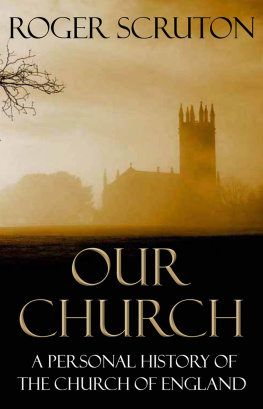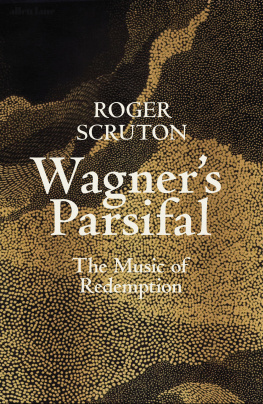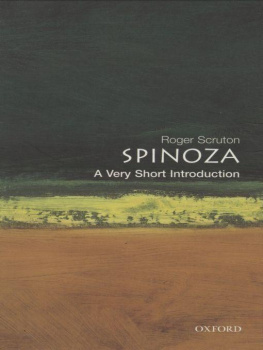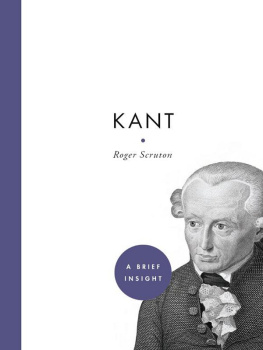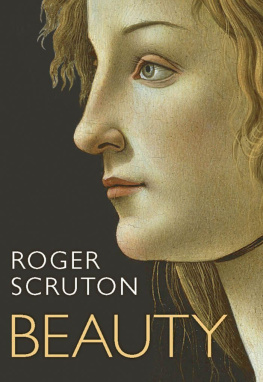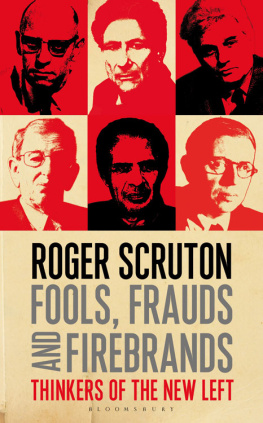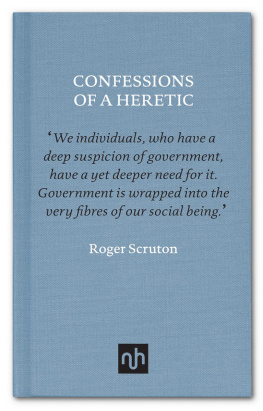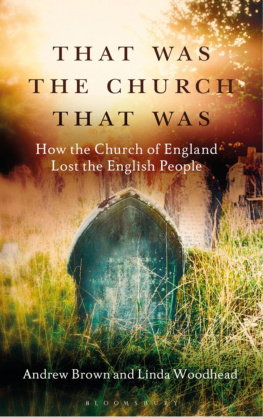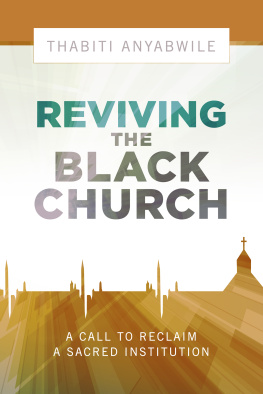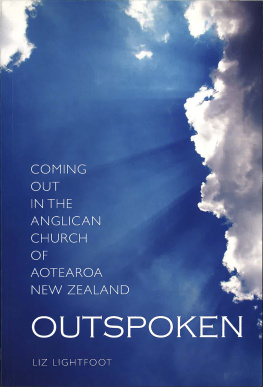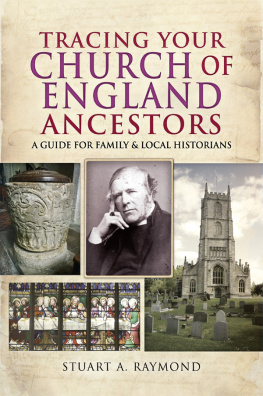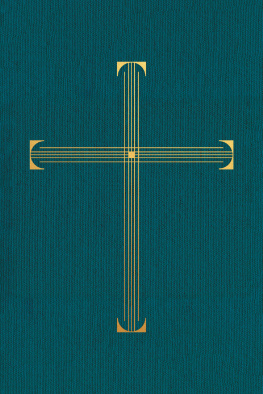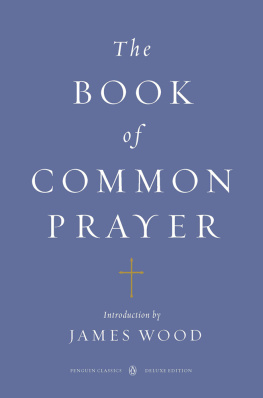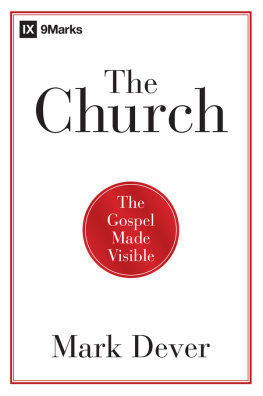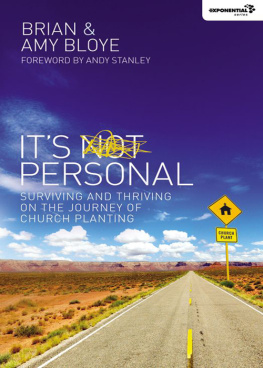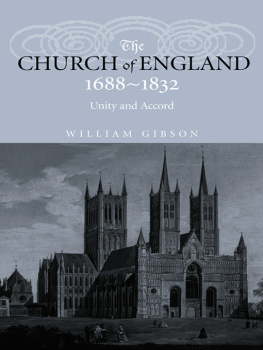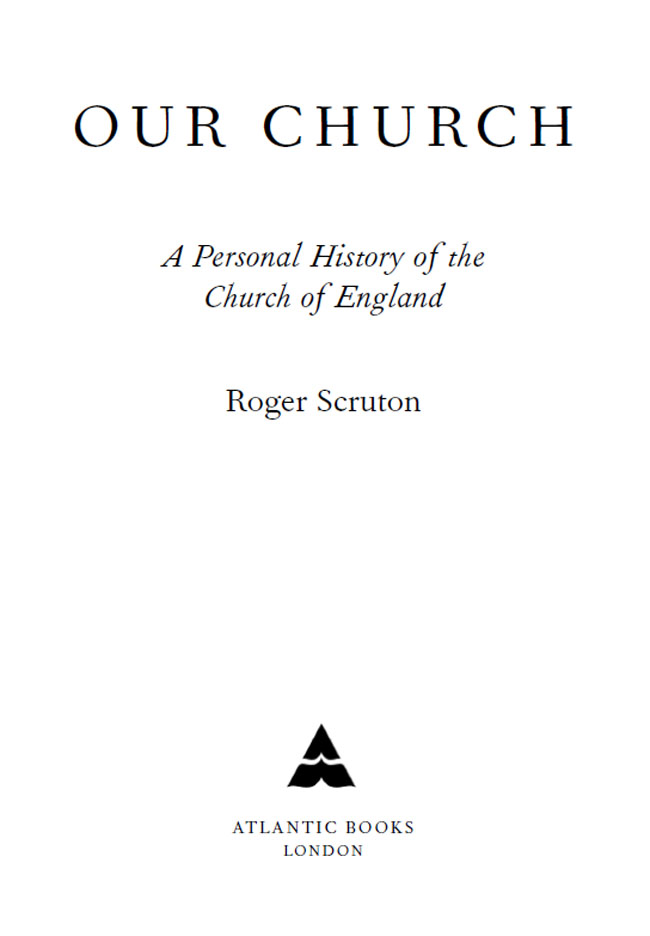OUR CHURCH
First published in hardback in Great Britain in 2012 by
Atlantic Books, an imprint of Atlantic Books Ltd.
This paperback edition published in Great Britain
in 2013 by Atlantic Books.
Copyright Roger Scruton, 2012
The moral right of Roger Scruton to be identified as
the author of this work has been asserted by him in accordance
with the Copyright, Designs and Patents Act of 1988.
All rights reserved. No part of this publication may be
reproduced, stored in a retrieval system, or transmitted in any
form or by any means, electronic, mechanical, photocopying,
recording, or otherwise, without the prior permission of both
the copyright owner and the above publisher of this book.
The author would like to thank Faber and Faber Ltd for kind
permission to reproduce lines from T. S. Eliots Little Gidding
and from Philip Larkins Church Going.
Every effort has been made to trace or contact all
copyright-holders. The publishers will be pleased to make
good any omissions or rectify any mistakes brought to
their attention at the earliest opportunity.
1 3 5 7 9 10 8 6 4 2
A CIP catalogue record for this book is available
from the British Library.
978 1 84887 199 1
ePub ISBN 978 1 78239 504 1
Printed in
Atlantic Books
An imprint of Atlantic Books Ltd
Ormond House
2627 Boswell Street
London WC1N 3JZ
Contents
Preface
This book is not an academic history of the Anglican Church or a systematic account, still less a justification, of its message. It is a personal record of what the Church of England has meant to me, and a tribute to its peaceful and creative presence in our national life. I hope it will be read with interest not only by Anglicans, but also by Christians of other denominations, as well as by non-Christians and non-believers. For it seems to me that our country is greatly misunderstood by the many influential people who fail to see that our national church remains part of its identity, and the key to its past.
Previous drafts of this book have been read by Pat Burke, Mark Dooley, Alicja Geciska, Bob Grant and Andrew Lenox-Conyngham, and I am grateful to them for their advice, criticism and suggestions. Here and there I have drawn on material already published in my book England: An Elegy, which contains a brief chapter on English religion, and I am grateful to the publishers of that book, Continuum, for permission to use short passages of the text.
Malmesbury, March 2012
ONE
Religion, Faith and Church
Since the Glorious Revolution of 1688 the English way of life has been often under the novelists microscope. And we, looking into that microscope, discover that there is no more curious aspect of the English than their attitude to religion. While the Church of England has been all-important in shaping the lives of the English people, the Christian religion has been, since the late seventeenth century, only a subdued presence in their lives. If Jane Austens young clergymen were training for the army rather than the priesthood, their relations with the women who assess them would remain unaltered. And if the livings and prebends, the bishoprics and deaconries, over which Trollopes characters so relentlessly strive, were lucrative situations in the entertainment industry, their social motives would hardly be changed. The philosopher David Hume remarked on the indifference of the English in matters of religion, and George Orwell repeated the observation in his wartime essay The Lion and the Unicorn. A modern observer could be forgiven for thinking that the Christian faith was some kind of mistake that the English once made, from the effects of which they freed themselves in the tumultuous civil conflicts of the seventeenth century. The Church that survived those violent times was one part of the system of English government, with no spiritual claims beyond the minimum required by social tranquillity. And the godless society of modern England, some might say, is exactly what we should expect, when the Church allies itself so closely with the State that it cannot afford the cost of religious passion.
Understandable though such an observation would be, it is not entirely accurate. The England that I knew as a child in the fifties was not godless. Most people declared some kind of Christian attachment, and churchgoing, though a minority pursuit, was not a target of ridicule. Those intellectuals who publicly questioned the dogmas of the established church were not evangelical atheists of the Richard Dawkins kind, but spirited agnostics like Jacob Bronowski, who conceded that they could not be entirely sure about Gods non-existence, even if they were pretty sure about everything else. The Anglican Church was represented in school assemblies across the nation, and the Bible was widely read both in the classroom and at home. Most people responded to the rare official enquiries about their religion with the harmless formula C. of E.. When, at the coronation of Queen Elizabeth II, the Church stepped into the centre of public life, few people doubted its right to do so, and even the most grudging of unbelievers was moved by the spectacle of the young Queen as she humbly accepted what she regarded as a sacred duty, and in doing so made it sacred.
I was nine years old at the time, and followed the coronation ceremony on the black and white television that our maternal grandmother had provided for the purpose. Our father was a socialist, a republican and an atheist. Yet he too watched the ceremony, regarding it as the sole justification to date of this contraption through which the world of morons had intruded into our house. He and our mother sat in silence, sometimes wiping away their tears. The rituals and words that they witnessed embodied the spirit of England, for whose sake they had made their share of wartime sacrifices. Here were the robes and crowns and diadems, the bishops, deans and archdeacons, the Lords Privy Seal, Great Chamberlain, High Chancellor and High Constable, the whole pack of cards floating on words and music imbued with that peculiar Anglican dignity, which is the dignity of a people who can never witness a ceremony without thinking of the mess that will need clearing up afterwards. But for a precious moment, as the illusions stepped down from the looking glass and occupied our ordinary living room, it seemed that all the recent sacrifices had been worth it.
Such moments in the life of a nation are rare. But they have their counterparts in the lives of individuals. Like nations, human beings pass through times of transition and proof, during which they depend on a validation that must come to them from others. Birth, coming of age, marriage and death are transitions in the life of the individual that are also transitions in the life of the tribe. In premodern societies these moments are marked by rites of passage, which lift them out of our day-to-day transactions and endow them with a transcendental meaning.which eternity is made manifest in rituals that alert us to the fact that far more is at stake in our lives than the vacillating course of human appetite. It is only thus that we can become fully aware of eternal meanings, and those who scoff at ceremonies register their scepticism towards the transcendental, which can show itself publicly in no other way. It is undeniable that this scepticism is now part of the English character. But it coexists with a certain curiosity towards the transcendental, and a desire to imagine it on the English model, as a place where we might be at home an eternal

